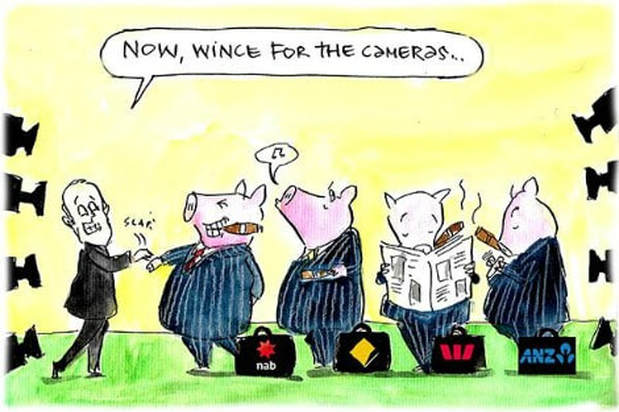What does the Banking Royal Commission tell us about HR practices & leadership?
All that is necessary for evil to triumph is for good men [and women] to do nothing.
Which of you saw the interview with Australian businessman Geoff Cousins on ABC’s The Business program on the day before Anzac Day last week?
Cousins called out the business community for not speaking up publicly to condemn the behaviour coming out in the Federal Government’s Banking Royal Commission:
“Where are the business leaders! For goodness sake, please come out and say “This is wrong”! … Speak up for what is right in business.”
The silence screams out louder than any words - to the staff in those organisations about what is rewarded around here, and to the community and their customers.
I am reminded of the quote at the beginning of this article – a very pertinent quote for Anzac Day, and one that is all too often forgotten in organisations and by leaders. By doing and saying nothing, leaders are speaking more loudly than they know.
And what about Human Resources?
There has been a similar silence from the HR community – both in academia, in professional associations, and in business. More than any group other than CEO’s and Boards, the HR profession, as the supposed champions of people and culture in organisations and the owners of processes that have rewarded the behaviour we are hearing about, should be standing up and speaking out.
As Cousins said about business, so I say about HR – “The reason people are suspicious of business [and HR] … is because it hasn’t done the right thing.”
Self-interest vs evidence and common sense
HR has even more responsibility to speak up as they should know that research and the evidence that has been around for over 40 years, together with a common sense understanding of what shapes human behaviour, would predict that the systems they own and administer would produce outcomes like those we are hearing about now.
For a summary of some of that research and evidence see books like Hard Facts, Dangerous Half-truths & Total Nonsense by Jeffrey Pfeffer and Robert Sutton, Drive by Dan Pink and Abolish Performance Appraisals by Tom Coens and Mary Jenkins. Or even easier – just describe how many of the core HR reward processes really work to an ordinary person with no vested interest in the systems and ask them what kind of behaviour and culture they think these practices would create.
Is work fundamentally different to the rest of our lives - and should it be?
If we applied these practices to other parts of our lives, what outcomes would we predict? Why do we act as if work is fundamentally different to the rest of our lives, and rewards and practices we think would produce bad outcomes in our families or social groups will produce good outcomes at work?
But common sense is distorted when you personally are a beneficiary and when you would be arguing for the removal of your own bonus.
Even if you were ultraistic enough to take a stand against the practices that you benefit from, you would then strike the opposition from your peers, your boss and anyone else in the organisation who would stand to lose from changing the practices that have provided them with access to the money, the status and the power that those HR owned processes have provided.
Ethics, evidence and speaking up
But surely, just as other recent Royal Commissions have done, it is now time for HR to have the courage to stand up and speak out. It is time for HR to take ownership of the evidence about what drives the best and the worst in human beings and point out the evidence about the kind of behaviour that many of their practices actually reward and that they need to change. It is time to take this opportunity to shift to evidence-based HR practices and systems that promote ethical behaviour and performance of teams and people who work in organisations.
Unfortunately, the power of vested interests and the social and ideological pressure to conform predict this will not happen. It is more likely that now, in organisations all over the business and HR community, rather than going back to first principles, common sense, rediscovering the evidence and research, and reinventing HR practices, people will be busily looking for the new shade of lipstick to put on the same self-interested pig.
Susan Kehoe
Consultant | Coach | Change Leader
Work with Susan
Susan specialises in strategy development through to implementation and performance improvement, people, leadership and culture change, and transformation and innovation. She brings practical experience and thought leadership gained from many years of leading successful performance improvement and change in some of Australia’s leading businesses and government. Her approach engages people and unlocks potential to improve service delivery and performance.
Cousins called out the business community for not speaking up publicly to condemn the behaviour coming out in the Federal Government’s Banking Royal Commission:
“Where are the business leaders! For goodness sake, please come out and say “This is wrong”! … Speak up for what is right in business.”
The silence screams out louder than any words - to the staff in those organisations about what is rewarded around here, and to the community and their customers.
I am reminded of the quote at the beginning of this article – a very pertinent quote for Anzac Day, and one that is all too often forgotten in organisations and by leaders. By doing and saying nothing, leaders are speaking more loudly than they know.
And what about Human Resources?
There has been a similar silence from the HR community – both in academia, in professional associations, and in business. More than any group other than CEO’s and Boards, the HR profession, as the supposed champions of people and culture in organisations and the owners of processes that have rewarded the behaviour we are hearing about, should be standing up and speaking out.
As Cousins said about business, so I say about HR – “The reason people are suspicious of business [and HR] … is because it hasn’t done the right thing.”
Self-interest vs evidence and common sense
HR has even more responsibility to speak up as they should know that research and the evidence that has been around for over 40 years, together with a common sense understanding of what shapes human behaviour, would predict that the systems they own and administer would produce outcomes like those we are hearing about now.
For a summary of some of that research and evidence see books like Hard Facts, Dangerous Half-truths & Total Nonsense by Jeffrey Pfeffer and Robert Sutton, Drive by Dan Pink and Abolish Performance Appraisals by Tom Coens and Mary Jenkins. Or even easier – just describe how many of the core HR reward processes really work to an ordinary person with no vested interest in the systems and ask them what kind of behaviour and culture they think these practices would create.
Is work fundamentally different to the rest of our lives - and should it be?
If we applied these practices to other parts of our lives, what outcomes would we predict? Why do we act as if work is fundamentally different to the rest of our lives, and rewards and practices we think would produce bad outcomes in our families or social groups will produce good outcomes at work?
But common sense is distorted when you personally are a beneficiary and when you would be arguing for the removal of your own bonus.
Even if you were ultraistic enough to take a stand against the practices that you benefit from, you would then strike the opposition from your peers, your boss and anyone else in the organisation who would stand to lose from changing the practices that have provided them with access to the money, the status and the power that those HR owned processes have provided.
Ethics, evidence and speaking up
But surely, just as other recent Royal Commissions have done, it is now time for HR to have the courage to stand up and speak out. It is time for HR to take ownership of the evidence about what drives the best and the worst in human beings and point out the evidence about the kind of behaviour that many of their practices actually reward and that they need to change. It is time to take this opportunity to shift to evidence-based HR practices and systems that promote ethical behaviour and performance of teams and people who work in organisations.
Unfortunately, the power of vested interests and the social and ideological pressure to conform predict this will not happen. It is more likely that now, in organisations all over the business and HR community, rather than going back to first principles, common sense, rediscovering the evidence and research, and reinventing HR practices, people will be busily looking for the new shade of lipstick to put on the same self-interested pig.
Susan Kehoe
Consultant | Coach | Change Leader
Work with Susan
Susan specialises in strategy development through to implementation and performance improvement, people, leadership and culture change, and transformation and innovation. She brings practical experience and thought leadership gained from many years of leading successful performance improvement and change in some of Australia’s leading businesses and government. Her approach engages people and unlocks potential to improve service delivery and performance.

